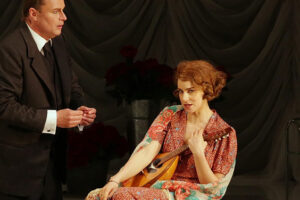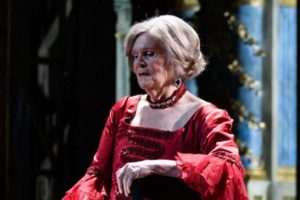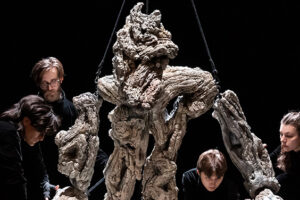

His student effort, Amelia al Ballo, was produced by the Met in 1938, and he composed almost the very first operas for radio (The Old Maid and the Thief, paradoxically popular on stage with small-scale companies) and television (the inescapable Amahl and the Night Visitors) and then for Broadway (The Medium and The Telephone; The Consul—which earned him a Pulitzer in 1950; The Saint of Bleecker Street), culminating in his World’s Fair effort, Maria Godilvin, an admired flop, and an opera commissioned by the Met, The Last Savage, a failure despite a glittering cast of the last Golden Age (Gedda, London, Peters et al.) The Last Savage is being revived at Santa Fe this summer. The Met declined his next submission, Goya, to his enduring bitterness. He turned to the City Opera for Help! Help! The Globolinks! and La Loca, Sills’s last vehicle. None of this made critics or audiences change their minds about him.
In his free time, Menotti set up house with Samuel Barber, writing the librettos for his early successful operas, notably Vanessa. It is a thousand pities the stage-canny Menotti did not write the libretto for Antony and Cleopatra; Zeffirelli bloated it badly. Menotti also created the Spoleto Festivals in both Italy and South Carolina, and it is really his efforts there that comprise his artistic legacy.
Today, Old Maid, Amahl and The Medium remain popular with very small opera companies, and worthy of their success: a not-too-astringent Italianate melody wedded to effective drama and shameless stagecraft. Singers who can act, especially women, adore them, and rightly so. In American postwar opera, admittedly not rich in melody, few tunes are as pleasingly evocative as “My Lover Said to Me” and “When the Earth Smells of Summer” from Thief or “Black Swan” from The Medium.
In The Consul, Menotti attempted to build a story around current headlines, mostly from Eastern European nations occupied by the Soviets, and a world full of displaced persons – his unspecified country and unspecific names place it almost anywhere: Sorel, Gomez, Magadoff, Kofner, Giulia, Boronel. John Sorel has been dabbling with the underground in his unnamed East European country and must flee.
His wife, Magda, encumbered by mother (who dies) and child (who dies) and the Secret Police (who never dies), tries to get a visa to emigrate from the unseen and enigmatic Consul, defended by his implacable Secretary in a Kafka-esque waiting room full of the desperate and forgotten. Eventually, despairing, Magda kills herself.
This torn-from-the-headlines tale secured Menotti the Pulitzer, and the archetypal, nonspecific nature of its situations and characters have kept The Consul relevant. Are there not still fascist dictators and secret police? Is the world not full of displaced persons? The melodies are less Italian, more astringent than in the past, as far into modernity as Menotti was willing to go – just far enough to disarm fair-minded critics without driving the Broadway public away. Today, their “modern” discords offend no ears, but the tunes lack enduring charm and personality.
The most winning moments of the score are the most operatic: a trio for the agitated Sorel family in the first scene, a fine concertato for a waiting room full of the “displaced” that ends Act I. The most famous number is Magda’s bitter parody of the endless documents she has had to fill in: “What is my name? Woman” in Act II, and its appeal to anyone who has been crushed by paperwork (and who has not?) has lasted.
If these and other moments seem calculated, Menotti calculated well. Freedom to oppose an overbearing state is not a fading issue. If anything, his simple characters and their simple story are too basic, too archetypal – they lack individuality, specificity, that would allow us to take them to our hearts. Melody can accomplish this, hint at depths of soul not obvious in a libretto, but Menotti’s melody is not rich enough for that.
Attempts to bring us to understand his heroine by showing us her desperate dreams (especially the last, when she is gassing herself to death) are lurid and surreal, Buñuelistic, without being personal to her. Magda is a terrific part, but she has none of the little flaws and idiosyncrasies that make Tosca or Butterfly or Violetta poignant and real to us, perhaps because Menotti started with a bare canvas and not with someone else’s play. (I can’t help wondering how The Consul would go over today in the former Soviet dictatorships. I’m sure it would be banned in current fascist states.)
Opera New Jersey plays in the sizable but intimate Matthews Theater of the McCarter Center in Princeton, conveniently across the street from the train station. This summer, The Consul alternated with The Barber of Seville, plus a Pasatieri premiere at a smaller theater. The Consul, which has only two sets (the apartment and the unseen Consul’s waiting room – here a wall of filing cabinet drawers rather than a naturalistic chamber) was cast with impressive young voices and a very professional orchestral contingent.
Michael Unger’s staging missed a couple of cues (I am recalling the old New York City Opera production), making John’s interactions with the secret police unnecessarily violent (in imitation, I believe, of current film and TV techniques) and the chorus of displaced persons a bit too artificially “posed,” which undercuts their reality. Too, Magda answers the phone in the final scene, though she says nothing. In Menotti’s directions, the phone (which is the Secretary calling with news of John’s arrest, news that might prevent Magda’s suicide) has ceased to ring by the time Magda enters.
Lina Tetriani, the slim, handsome Georgian soprano who sang Magda, has performed Norma and Traviata, but has no use for coloratura in this role. It is a warm, sizable, well-supported voice, and she has dramatic power and instinct. (The final scenes of that Traviata and Norma must have been interesting.) I would have placed her as a Verdi or Puccini spinto in bud (which is the sound Menotti was aiming for), and I doubt a large house would put her out. Her acting skills are good and she knows when to bite a syllable to make an effect. It will be interesting to see where she goes from here.
The second most important – but in many ways the most interesting – role in the opera is the Secretary. She actually has facets, and ought to bring down the house when, after a flirtatious, giggly phone call with a presumed boyfriend, she turns to the waiting room with a steely “Next.” Menotti gives her substance at the last by having her briefly show us her bystander’s despair – she is not inhuman; even in a bureaucracy, all bureaucrats are human. (Menotti did not foresee the takeover of machines.) Audrey Babcock was a little too well-dressed and dramatically undercooked for this enigmatic figure; she needs tighter direction.
Veteran Joyce Castle, whose classic contralto shows signs of classic contralto wobble, earned enthusiastic applause as the Mother. (It is never clear whether she is John’s mother or Magda’s mother; is that Menotti’s intention?)
Nicholas Pallesen, who was so good as Robert Storch in the City Opera’s Intermezzo last fall, was striking in the one-dimensional role of Magda’s husband, John Sorel, hero of the resistance. One would like to hear more of his clear, active baritone. Matt Boehler, whose suave and sexy bass is familiar to devotees of Steven Blier’s New York Festival of Song, sang a suave and sexy Secret Police Agent, infusing his lines with the proper insinuating menace: Just tell us what we want to know and you’ll have no more problems. The first sip of Kool-Aid is free. This is another voice we want to hear more of (and will).
Among the many hopeless applicants in the waiting room, all vocally satisfying but none looking terribly worn out or frazzled by their experience (haven’t you ever been on an endless line in a waiting room? Well, play that!), Clara Nieman’s Vera Boronel, Nathan Wilson’s Mr. Kofner and Jason Ferrante’s Nika Magadoff showed promise.
The small orchestra, led by Joel Revzen, gave a perfectly respectable account of Menotti’s carefully designed score lacking some of the dramatic point, the irony, of his effects. They never came close to drowning out the signers – indeed, I suspect several of the singers were holding back to let the music through.
Diction was excellent all around, and I question the necessity for surtitles which distract one from the action. Perhaps audiences have grown dependent on them; I’d have preferred not to have them at all. There are no ambiguities in Menotti’s story and with singers like this performing in the audience’s language, I do not see the purpose of them.
Photo: Jeff Reeder
























Comments